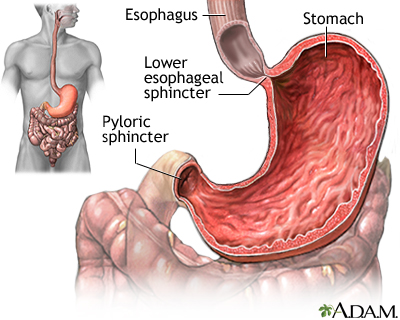Small Cell Lung Cancer

What is Stomach Cancer?
Stomach cancer, also known as gastric cancer, is a disease characterized by the abnormal and uncontrolled growth of cells in the stomach lining. It's among the leading causes of cancer-related deaths globally.
Who's at Risk for Stomach Cancer?
Stomach cancer risk increases with age, with most people diagnosed aged over 60. It is more common in men than women. Other risk factors include a diet high in salty and smoked foods, low in fruits and vegetables, long-term stomach inflammation, certain infections like Helicobacter pylori, smoking, certain inherited conditions, and previous stomach surgery.
What Causes Stomach Cancer?
Stomach cancer usually starts when a mutation causes cells in the stomach lining to grow rapidly and form a tumor. While the exact cause of these mutations is often unknown, various risk factors may contribute, including genetic factors, dietary habits, and chronic infection with bacteria such as H. pylori.
How does Stomach Cancer Start?
Stomach cancer typically starts in the innermost layer of the stomach, known as the mucosa, and can then grow into the other layers. It often begins with precancerous changes in the stomach lining, which may progress to cancer over many years.
What are the Symptoms of Stomach Cancer?
Early-stage stomach cancer often produces few symptoms, making it difficult to detect early. As the cancer progresses, symptoms may include indigestion, stomach discomfort, nausea, loss of appetite, unintentional weight loss, feeling full after eating small amounts, vomiting (with or without blood), and anemia.
How is Stomach Cancer Diagnosed?
Stomach cancer is often diagnosed through endoscopy, where a flexible tube with a camera is used to examine the stomach. Biopsies may be taken during this procedure for examination under a microscope. Other tests may include imaging studies like CT scans, and blood tests to check for anemia or the presence of H. pylori infection.
How can Stomach Cancer be Treated?
Treatment options for stomach cancer depend on the cancer's stage and the patient's overall health. They may include surgery to remove part or all of the stomach, chemotherapy, radiation therapy, targeted therapies that focus on specific aspects of the cancer cells, or immunotherapy to boost the body's natural defenses.
What Complications may Occur with Stomach Cancer?
Potential complications of stomach cancer include spreading (metastasizing) to other parts of the body, difficulty eating, weight loss, and fatigue. Treatment side effects can also lead to complications, such as surgical complications or side effects from chemotherapy or radiation.
How can I Prevent Stomach Cancer?
While it's not possible to prevent stomach cancer entirely, reducing your risk is possible. This includes eating a diet rich in fruits and vegetables, quitting smoking, exercising regularly, maintaining a healthy weight, and avoiding processed, salty, or smoked foods. Regular check-ups are also crucial, especially for those with known risk factors.
Long-term Management of Stomach Cancer
Long-term management of stomach cancer may involve regular follow-up appointments to monitor for recurrence, managing side effects of treatment, and dietary modifications to adapt to changes in the stomach's functioning. Emotional and psychological support is also essential due to the challenging nature of the disease.
What is Recent Research Saying About Stomach Cancer?
Recent research is focusing on understanding the genetic and molecular mechanisms that drive stomach cancer to develop more targeted therapies. Additionally, there's ongoing research into improving early detection methods and understanding the role of diet and gut microbiota in gastric cancer.
Where can I go for More Information on Stomach Cancer?
For more information on stomach cancer, you can consult resources such as the American Cancer Society, the National Cancer Institute, or the World Health Organization. Your oncologist or healthcare provider can also provide personalized advice and information.

